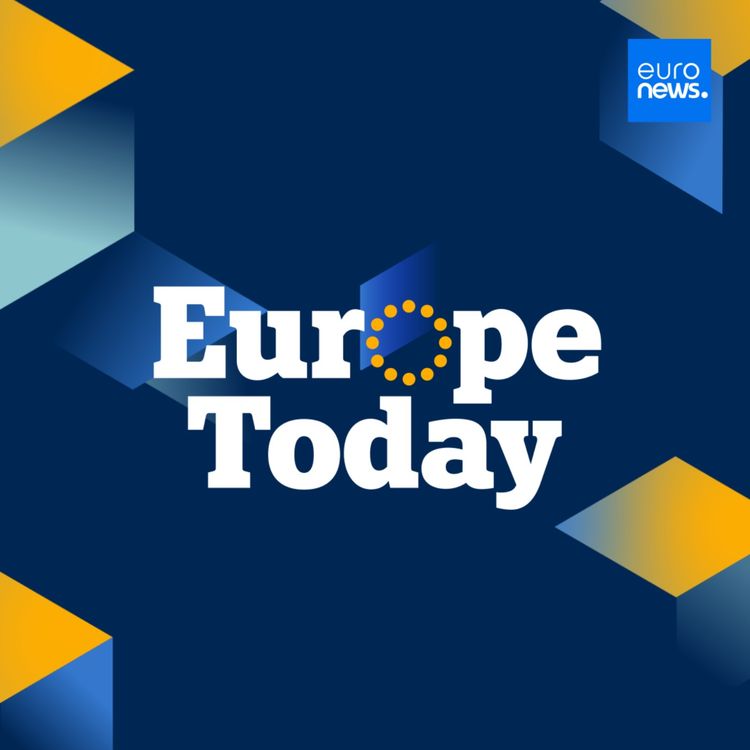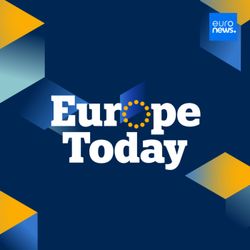Share

Radio Schuman
Is non-alcoholic wine no longer a taboo in Europe?
Season 2, Ep. 144
•
Europe Today is Euronews’ daily podcast hosted by Maria Tadeo and Méabh Mc Mahon, broadcasting directly from Brussels, at the heart of Europe.
Every morning, we deliver the top and exclusive stories shaping the European Union (EU) and beyond.
Stay ahead with the key news and insights that matter in Europe today.
More episodes
View all episodes

25. "We have to speak from a position of strength" over Ukraine says Latvian Defence Minister Andris Sprūds
14:23||Season 3, Ep. 25On Europe Today, your daily Euronews podcast, presented by Méabh Mc Mahon, we are joined by Andris Sprūds, Defence Minister from Latvia, who insisted on the collective defence that NATO guarantees. Our correspondent, Shona Murray, brings us the latest over the fresh round of sanctions on Iran that the EU foreign affairs chief Kaja Kallas finalised. Our EU editor, Maria Tadeo, gives us all the details over the signature of the trade deal with Mercosur, a moment that has been in the making for 26 years.
24. President Trump dials down the rhetoric on Iran
14:31||Season 3, Ep. 24On Europe Today, our daily Euronews podcast with Méabh Mc Mahon, we bring you updates on Greenland and Iran. Today: “we agree to disagree” — talks between the Foreign Ministers of Denmark and Greenland ended without resolution in Washington, as Donald Trump insists Greenland is vital for US security and NATO allies announce new troop deployments. Shona Murray breaks down the Greenland talks, our EU editor Maria Tadeo analyses Iran, and David McAllister, senior MEP and Chair of the European Parliament’s Foreign Affairs Committee, joins us on global and EU foreign affairs.
23. Metsola calls for action as Iranian regime is "on its last legs"
14:46||Season 3, Ep. 23Title: Metsola calls for action as Iranian regime "on its last legs"Description: On Europe Today, your daily Euronews podcast, presented by Méabh Mc Mahon, we have an exclusive interview Roberta Metsola. The European Parliament president told Euronews that the EU has a "golden" opportunity to show its commitment to freedom. We also spoke with Pascal Lamy, former EU commissioner and former WTO boss.And our correspondent Shona Murray brings us the latest updates over president Trump's threats to acquire Greenland.
22. Trump’s Greenland stance is a major threat to NATO, says Margrethe Vestager
14:45||Season 3, Ep. 22On Europe Today, your daily Euronews podcast, presented by Méabh Mc Mahon, we are joined by the Danish politician Margrethe Vestager, former vice president of the European Commission. Our EU editor, Maria Tadeo, brings us the latest news on the situation in Greenland and the threats posed by US president Donald Trump. We also speak to our correspondent in Paris, Sophia Khatsenkova, about the appeal the far right leader Marine Le Pen is facing today in court and the consequences for the French presidential elections in France next year.
21. Dominique de Villepin tells Trump not to intervene in Iran
14:59||Season 3, Ep. 21On Europe Today, your daily Euronews podcast, presented by Méabh Mc Mahon, we are joined by Dominique de Villepin, former Prime Minister of France. De Villepin asks Trump and the EU "to find the right balance to not make things worse" in Iran. In our first show in 2026 we analyse what is going on in this very intense beginning of the year and our EU editor, Maria Tadeo, brings us the latest on the ongoing protests in Iran.
20. 90 billion loan for Ukraine and EU-Mercosur trade deal on hold
14:46||Season 3, Ep. 20On Europe Today, your daily Euronews podcast, presented by Méabh Mc Mahon, we have a special edition zooming in on the European Council summit that lasted 16 hours long. Our EU news editor Maria Tadeo brings the latest on the 90 billion loan for Ukraine that will be raised by joint debt. We also speak to Sasha Vakulina, our Ukraine correspondent, on how this will impact Ukraine and we have the latest on how the Italian Prime Minster brought about the postponement of the EU-Mercosur trade deal.
19. Tense summit underway in Brussels, but Luxembourg PM says he cannot be nervous
14:46||Season 3, Ep. 19On Europe Today, your daily Euronews podcast, presented by Méabh Mc Mahon, we zoom straight into the high stakes European Council summit taking place today in Brussels. From saving face on Ukraine, to stopping the Mercosur trade deal from falling off a cliff- big decisions on key issues will have to be made today. Our EU editor Maria Tadeo speaks to Luc Frieden, the prime minister of Luxembourg who says he never gets nervous as a head of state. We also have sharp analysis from our senior correspondents Shona Murray and Sasha Vakulina on crucial funding for Ukraine. You can watch Euronews or visit our website for a live blog on the ongoing summit.
18. Europe is our "destiny," says Kosovo’s President Vjosa Osmani
14:50||Season 3, Ep. 18On Europe Today, your daily Euronews podcast presented by Méabh Mc Mahon, we are joined by Vjosa Osmani, the president of Kosovo who is in Brussels for an EU-Western Balkans summit. We also travel to Strasbourg where MEPs are meeting for an action-packed session ahead of the Christmas holidays. Our Euronews EU editor Maria Tadeo speaks to EU Commissioner for housing Dan Jørgensen about the first ever EU strategy for housing.
17. "Don't sacrifice the farmers for the profit of some multinationals" says MEP Thomas Waitz
14:31||Season 3, Ep. 17On Europe Today, your daily Euronews podcast presented by Méabh Mc Mahon, we travel to Strasbourg to hear from Maria Tadeo, our EU news editor about how Rome is stuck between protecting farmers and maintaining exports to South America. We are also joined by Thomas Waitz, Austrian MEP for the Greens who is an ecological farmer by trade. For an update on the Ukraine peace talks in Berlin, we travel to the German capital to speak to our correspondent Laura Fleischmann who tells us about the German chancellor's great relationship with President Trump.